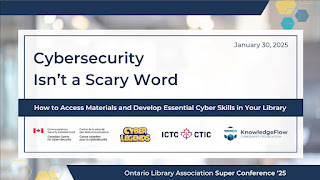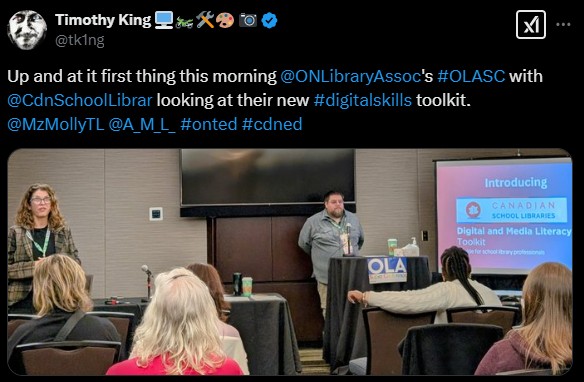I've watched my brilliant partner attend and then volunteer at the O.L.A. Super Conference for about a decade now. I've long had a crush on libraries (and librarians), but have never attended. In my new role I bring federally funded cybersecurity and digital skills opportunities into classrooms, so attending the OLA Super Conference offered an opportunity to connect and explore with library digital early adopters, of which there are many.The first time I laid hands on a computer in the early 80s was when my middle school library got Commodore PETs, so in my mind libraries are the spaces where we make first contact with new information mediums and media. When I started teaching it was my school's librarian who asked me about this new fangled 'wi-fi' thing. I helped him set up a router in our library, making us (I believe), the first school in Ontario that offered wifi to those few students with new-fangled Blackberrys and PDAs. Librarians are always looking at emerging information tools that give their patrons/students access to the information they seek.
.JPG)
That's why I was there, but the OLA Superconference became about much more than my work as it asks complex questions about the topics that tie society in knots. Librarians are the ones asked these difficult questions and libraries are one of few remaining safe spaces where people can go to get unbiased information without being treated like a consumer or a political target. Just like the BCTLA/Treasure Mountain national conference last year, the speakers and subjects at #OLASC were designed to challenge assumptions and offer librarians support in changeable times.
 |
| Mom at work... a message to our son who was at home doing full time shift work. |
Vivek Shraya's opening keynote about how your 'self' is always in flux offered some much needed insight on how to be gentle with yourself in difficult times, but immediately after I attended Cory Doctorow's talk about his latest book, Chokepoint Capitalism, which I'd been reading when I attended the BCTLA/Treasure Mountain conference last fall. Cory stuffed 2 hours worth of thinking into his hour long talk, riffing on the attention economy trap we've fallen into and talking about how individual action to systemic failures aren't an effective use of your time. He gave the example that if you spent hours trying to find locally sourced markers to make a poster for an anti-Amazon protest, but missed the protest because you spent all your time trying to not use Amazon, you aren't putting your energy where it might produce a systemic response to a systemic failure.

Staring into the abyss of the many problems we face is something librarians have to do every day when patrons comes in with these difficult questions. Yet relevance and support for programming was a constant theme at the conference. Feather Miracle accepted the OLA's President's award for keeping up the fight even as libraries in indigenous communities closed at record rates. As I mentioned online, I missed the part in Truth & Reconciliation that focused on closing community supports like libraries in first nations.
These big problems thematically swirled around this conference in a way that you don't see in education or technology events. Librarians need to collaborate on these issues because we're all facing them and library learning commons are where they come up, but the conference also offered me 'technology stream' opportunities specific to my current job.
On Thursday I listened to the Guelph/Wellington Public Libraries (my local) talking about how they worked on the front lines closing the digital divide during lockdown. I was told that our school board was providing connectivity for students in need, but it looks like they just tapped into the hard work that the public library was doing. The room was absolutely packed, suggesting that crossing the digital divide during a pandemic is another one of those systemic problems we're all trying to solve individually. System failures surround us but individuals keep trying to make it right.
The London Public Library and Crouch Neighbourhood Centres did a talk about how to cross the connectivity in gap by offering connectivity to those unable participate in Canada's digital economy. The digital divide is deep and wide, but targeted programs like this work. LPL did the initial delivery of connective cellular technology and discovered that most of their devices were being used in cottage country by people who didn't want to pay their own way in data (at their cottage), but by partnering with Crouch (LPL run a branch out of Crouch), the devices found their way into the hands of people who needed them. Talks like these showed me that there are solutions to these seemingly insurmountable social inequities, but no one to scale them systemically. Systemic failures surround us but individuals keep struggling to try and make it right. If only we had some kind of representative 'democracy' that governed in the peoples' interest, but then maybe most Canadians aren't bothered with helping those in need.

After attending the OLA Superconference I'm more focused on connecting with public libraries as they also reach children in need, but beyond our struggling public school systems. Every student (home schooled, public schooled, private schooled) students make use of their public libraries, so working with them to help close that digital divide is a new angle I'm keen to develop. It's nice to know libraries are still working hard to help people manage the information tsunami we're all trying to swim in - there are lots of opportunities to work emerging digital media literacies in there too.
I watched a number of author talks and book signings while at the OLASC. It'd be really cool to return next year for work, do a presentation on digital skills and cybersafety and then take a timeout to go do an author talk. Bring it on, OLASC 2024!
.jpg) |
A World War 2 historical fiction novel coming soon to a library near you!
Under Dark Skies. |

























.JPG)





.jpg)